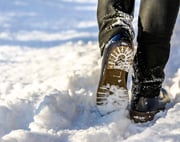Slips, Slides: Winter Injuries Can Be Serious
By Cara Murez HealthDay Reporter
MONDAY, Jan. 2, 2023 (HealthDay News) -- Wearing proper gear, watching out for snow and ice hazards, and “walking like a penguin” are just some of the tips that can help prevent winter accidents, one medical expert says.
“A variety of injuries can occur during the winter,” cautioned Dr. Mahmood Gharib, a physiatrist at the University of Minnesota Medical School, in Minneapolis. “If someone slips or falls on icy surfaces, an injury can range from spine and musculoskeletal injuries — such as sprains and broken bones — to head and brain injuries — such as a concussion.”
Winter sports are also a common cause of injury, Gharib added, while frostbite and hypothermia are additional concerns.
People should be mindful of slippery or icy surfaces that may be hard to see. Use extra caution near water runoff areas such as downspouts, landscaping, parking ramps and outdoor stairwells because of the possibility of black ice.
Stay on designated sidewalks and avoid taking shortcuts through grass and landscaping, Gharib advised.
“Walk like a penguin,” Gharib said in a university news release. This looks like moving slowly and walking flat-footed. Use a wide stance, taking small, shuffle-like steps. Keep your center of gravity over your feet, using your arms for balance.
Dress appropriately, wearing multiple layers for warmth. Wear appropriate footwear to limit slipping.
Gharib suggests that a few gentle stretching techniques can get your body prepared for the hard work of snow shoveling.
An ergonomic shovel made of lightweight, durable metals or plastic can reduce stress on your back. And an adjustable handle can provide the best fit.
Instead of waiting for snow to accumulate, shovel often and early, but pace yourself. Heavy, wet snow can strain your back. Use proper lifting techniques, bending at the hips and knees, pushing instead of pulling and limiting excessive lifting.
Sledding, skiing and snowboarding should be done in appropriate and designated areas, Gharib noted.
Wear protective gear, including helmets designated with MIPS (multi-directional impact protection system). Avoid areas close to roads, fences or densely populated trees. Always sled feet first and make sure children are accompanied by adults.
Spinal and head injuries can be very serious, so anyone who has significant trauma to the head and spine should seek medical help, Gharib stressed.
“These types of injuries may not always appear immediately obvious, however, the time between injury and treatment could help limit the severity and extent of damage,” he said.
Most back injuries typically resolve within a few days or weeks. See a doctor if you have any new or worsening weakness, numbness or tingling, bowel and bladder changes, or pain that does not respond to rest and over-the-counter medications.
More information
The U.S. Centers for Disease Control and Prevention has more on winter safety.
SOURCE: University of Minnesota Medical School, news release, Dec. 28, 2022

The news stories provided in Health News and our Health-E News Newsletter are a service of the nationally syndicated HealthDay® news and information company. Stories refer to national trends and breaking health news, and are not necessarily indicative of or always supported by our facility and providers. This information is provided for informational and educational purposes only, and is not intended to be a substitute for medical advice, diagnosis, or treatment.

